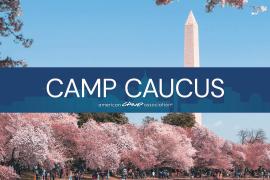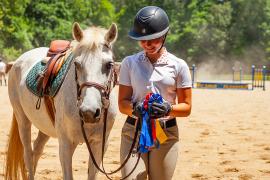Results from a research study of COVID-19 cases and their relation to the use of nonpharmaceutical interventions (NPIs) in camps during summer 2020 will be published next week. This research study, entitled, “Effectiveness of Non-Pharmaceutical Interventions on Child and Staff COVID-19 Cases in US Summer Camps,” was led by Helen Suh, ScD, of Tufts University. The study analyzed data collected from 486 camps — including both day and overnight camps — as part of ACA’s CampCounts Survey, an annual post-season survey of camp operators. The survey responses included data on COVID-19 cases in campers and staff and on adherence to a variety of NPIs, including:
- Camper and staff quarantine at home or at camp
- Staff and camper use of facial coverings
- Physical distancing between cohorts and groups
- Reduced camp capacity
- Strict use of program and activity cohorts
- Hand and cough hygiene (washing and sanitizing)
- Increased surface cleaning and disinfection
The study found the overall risk of COVID-19 in these camps was low last summer, even in areas with high community COVID-19 rates. Diligent camper and staff use of facial coverings and physical distancing policies were found to be effective risk-reduction measures, with greater reductions in risks resulting from constant use of camper facial coverings.
Effectiveness of NPIs at Camp during Summer 2020
The research study findings demonstrate the importance of diligent use of facial coverings for staff and particularly campers and of targeted physical distancing measures to reduce SARS-CoV-2 transmission at both day and overnight summer camps. The findings also have important implications for future COVID-19 mitigation strategies in other child congregate settings, such as schools, childcare settings, community and recreational centers, and after-school programs. For spring and summer 2021, camp leadership is strongly encouraged to continue to follow state regulations and to adopt best practices provided by the US Centers for Disease Control and Prevention (CDC) and in the Field Guide.
Research Findings and Implications for 2021 Summer Camp Operations
Continued planning for and implementation of a vigilant, layered NPI strategy will serve camps well for the summer 2021 season. As described in the Field Guide, we recommend that camps require all campers and staff to wear facial coverings and to practice physical distancing (through modified programs, such as outdoor programming with low-contact sports/activities, and use of activity cohorts and pods) at all times. Camps should also require:
- Pre-camp quarantine at home or at camp for campers and staff
- Daily health checks for campers and staff
- Hand and cough hygiene (washing and sanitizing)
- Increased surface cleaning and disinfection
- Enhanced ventilation, air circulation, and filtration indoors
This multifaceted strategy offers flexibility in the selection and implementation of NPIs to suit a camp’s risk management profile. For example, extending a camp session beyond two weeks and maintaining the cohort/bubble strategy may allow for relaxation of mask wearing among a cabin or cohort.
This research study is of high value in discussions with state and local departments of health as well as with parents and caregivers on planned operations at camp. Note that these strategies will require regular updating to incorporate any new information and developments, including those related to medical testing and vaccine availability.
About Vaccines and Camp Operations 2021
As of January 2021, vaccines are expected to be available to adults in the general population come late winter and spring, possibly in time for spring and summer camps. Vaccines are not expected to be available for children aged 12–16 years old until late spring or summer, and possibly later. There is no target date for the release of vaccines for children younger than 12 years old at this time. So camp communities will likely have vaccination rates well below community rates required for herd immunity. Because of this and the lack of information on whether vaccinated individuals could still spread the virus if infected after vaccination, camps are advised to maintain the NPI strategy outlined in the Field Guide. As additional medical information is released, the Field Guide will be updated.
About Research Study Preprint Availability and Peer-Review Publication
The summer 2020 camp research study will be available through medRxiv's preprint server once published. medRxiv (pronounced “med-archive”) is an online archive and distribution server for unpublished manuscripts (“preprints”) in the medical, clinical, and related health sciences. Preprints are preliminary reports of work that have not been certified by peer review. The manuscript is being submitted for peer review and publication, but in the interest of releasing the information to concerned camp professionals and communities, the preprint manuscript is being made available to the public. When published (expected in mid-2021), ACA will update this blog post with the link to the publication.
Photo courtesy of Liberty Lake Day Camp in Bordentown, New Jersey.
The views and opinions expressed by contributors are their own and do not necessarily reflect the views of the American Camp Association or ACA employees.



